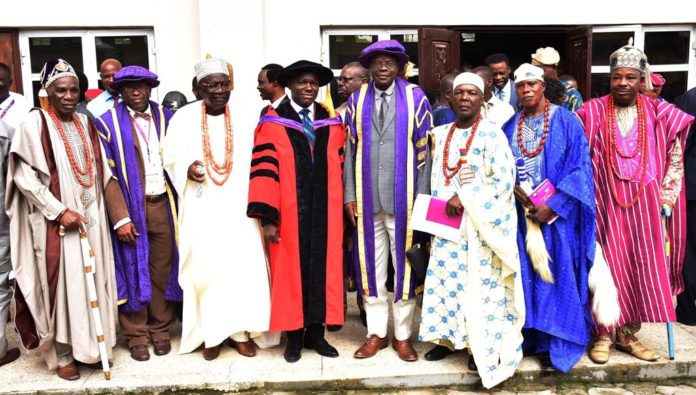
A Professor of Public Law and Don of the Faculty of Law, Adekunle Ajasin University, Akungba Akoko, Ondo State, Olubayo Oluduro, has counselled Nigerian government to give more attention to curbing corporate and environmental crimes being perpetrated by Multinational Corporations, MNCs, through exploration and exploitation of natural resources, especially in the Niger Delta region of the country.
Professor Oluduro gave the counsel on Tuesday while delivering the 14th Inaugural Lecture of the University, entitled, “Surviving the Armageddon: the Law as Elixir for Environmental Crimes in Nigeria’s Oil Industry”.
Describing environmental crime as a serious problem within the global community because of the severe and horrific consequences of its impact to human and the environment, Prof. Oluduro, berated Nigerian government for not fulfilling the deterrence and punishment objectives of its environmental legislation.
Prof. Oluduro said, “The rare prosecution of the Multinational Corporations for environmental crimes committed downplays its (government) seriousness and suggests that this type of crime is of less importance, despite the severe harm caused to the environment and human health arising from their business activities.
“While “street crime” is given more political and enforcement attention, “white-collar” or corporate crime is largely ignored ‘unless the consequences of such corporate actions result in several immediate deaths, affect hundreds or even thousands of lives, and cost several hundred millions of dollars
“It is no wonder the public perceives environmental crime as less serious when compared to street crime, despite the fact that environmental crime is responsible for more illnesses, diseases, and deaths than street crimes.”
READ ALSO: Effective Social Housing Scheme, Panacea for Urban Development Predicament – Don
He lamented that despite that, oil industry in Nigeria provides 80 per cent of the budgetary revenue, 95 per cent foreign exchange earnings and contributes over 14 percent to the Gross Domestic Product, the Niger Delta region with its abundant natural resources, presents horrendous examples of environmental degradation caused by the activities of the oil MNCs operating in the region right from the discovery of oil in commercial quantity in the area in 1956 at Oloibiri, now in Bayelsa State.
The don, who noted that some of the MNCs, including Royal Dutch Shell, Chevron-Texaco, Exxon-Mobil, Agip and Elf, were operating joint-venture partnerships with the Nigerian Government, bemoaned the MNCs’ crimes committed against the environment which have become so devastating and more damaging as a result of the uncontrolled exploration and exploitation of natural resources and other unsustainable activities that pollute the air, water and soil.
He added that life expectancy in the Niger Delta which was once below 70 years was now around 45 years and far below the national life expectancy which hovers above 50 years.
He emphasized that if the nation must survive the environmental armageddon, government must demonstrate strong political will, adequate resources, international cooperation and the determination to make the violators, particularly the MNCs, accountable for the ecological threats they pose.
He called for a stricter enforcement of environmental laws and regulations to address issues of environmental crimes in the Nigerian oil industry as well as the use of private prosecution to address environmental harms that are considered crimes, adding that the civil society and environmental NGOs could play a combination of advocacy and enforcement roles in the fight against environmental crimes in the country.
Earlier, the Vice Chancellor of AAUA, Professor Igbekele Ajibefun, had congratulated the Inaugural Lecturer on being the first presenter in the Faculty of Law of the University.
He described Inaugural Lecture as once-in-a-life-time endeavor of the presenter, which also offered AAUA the opportunity to acknowledge and showcase its numerous academic achievements, researches, innovations through its academics who have attained professorial cadre.















